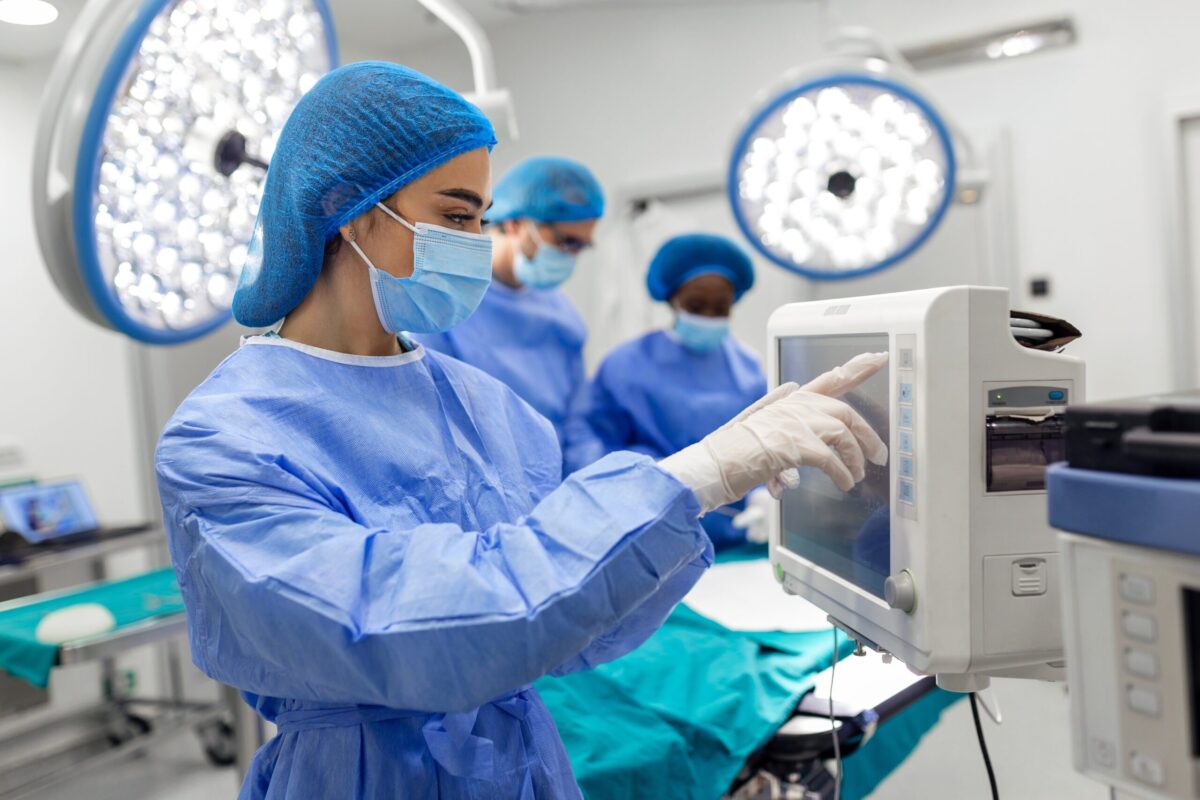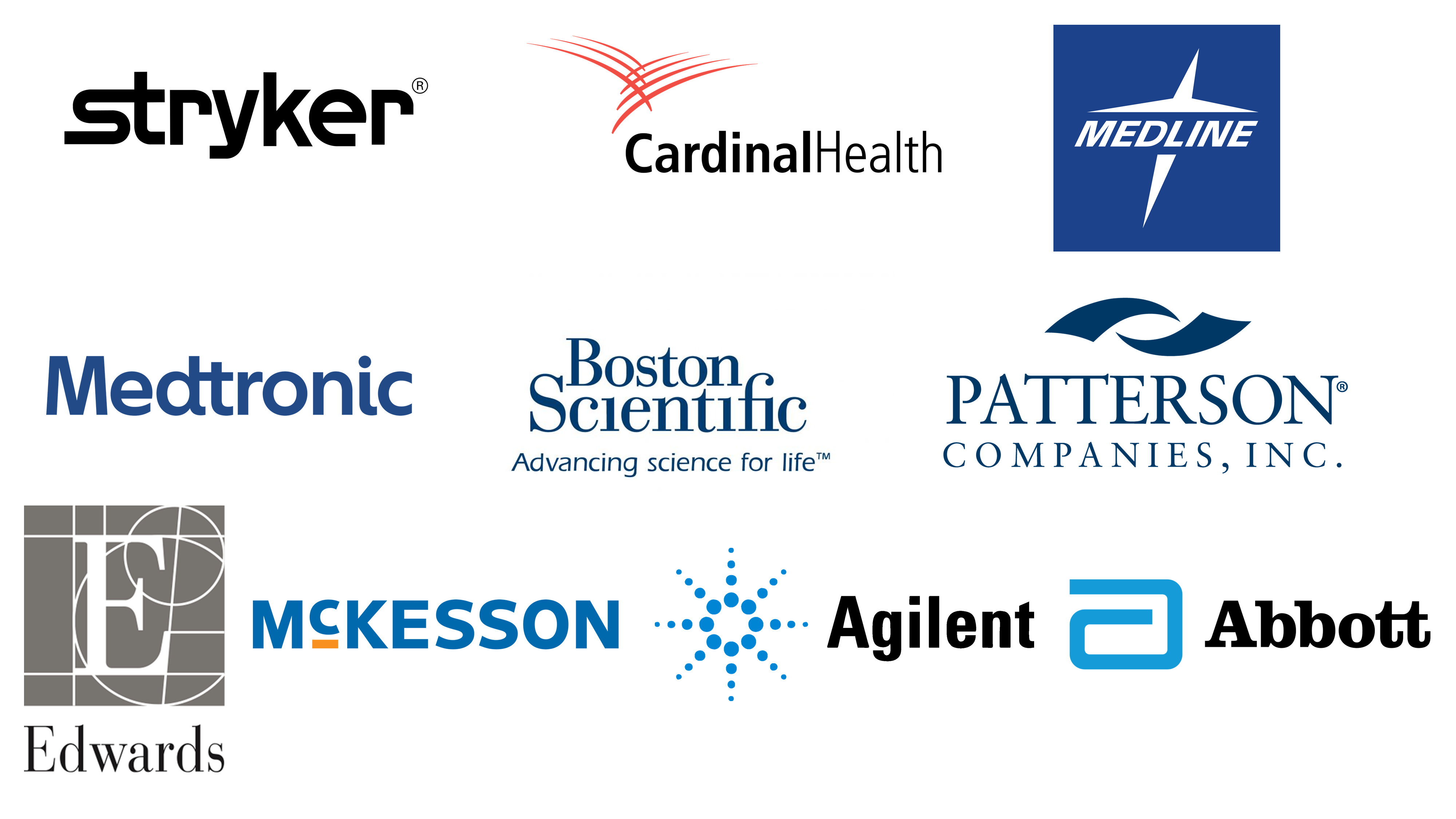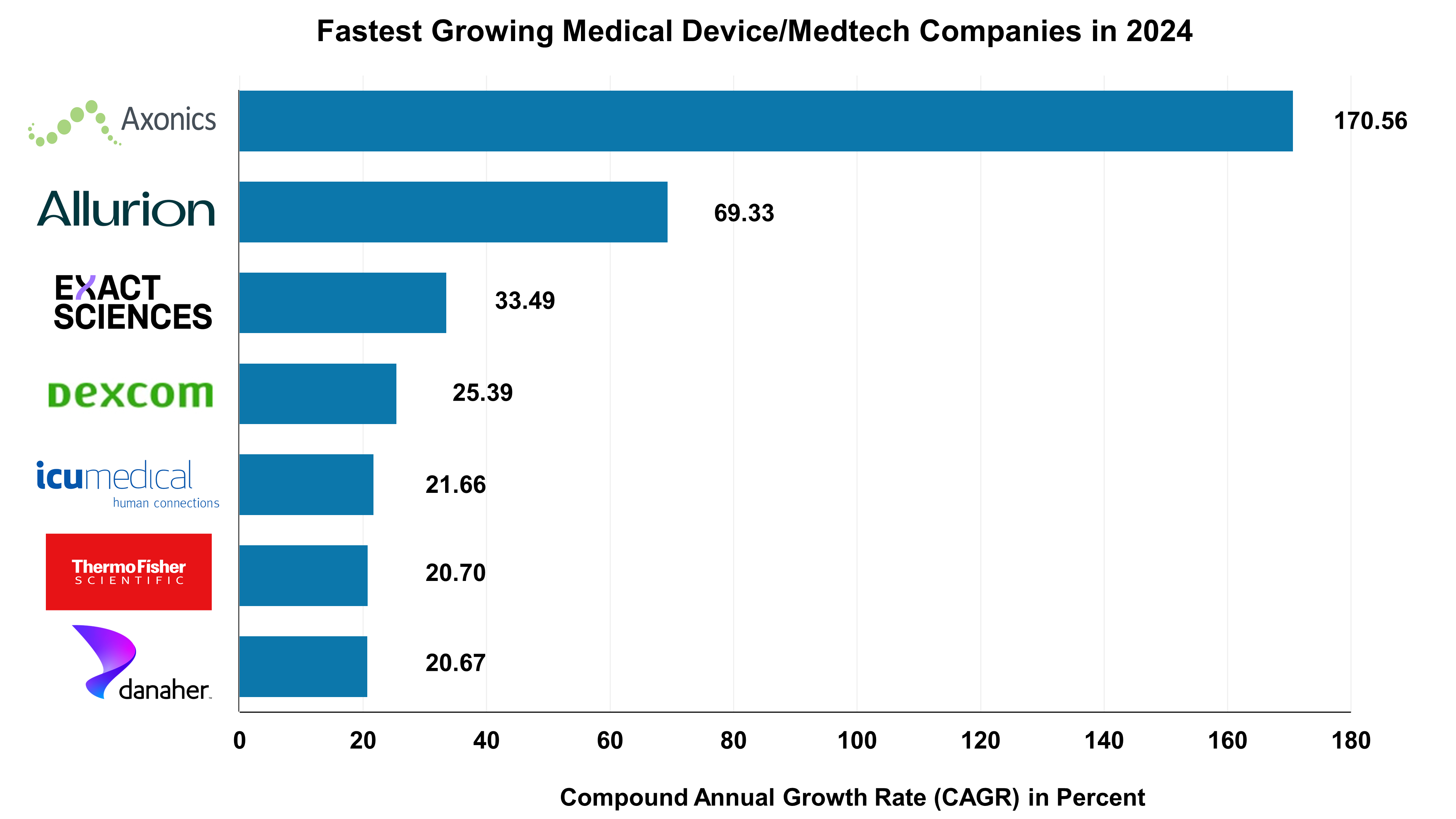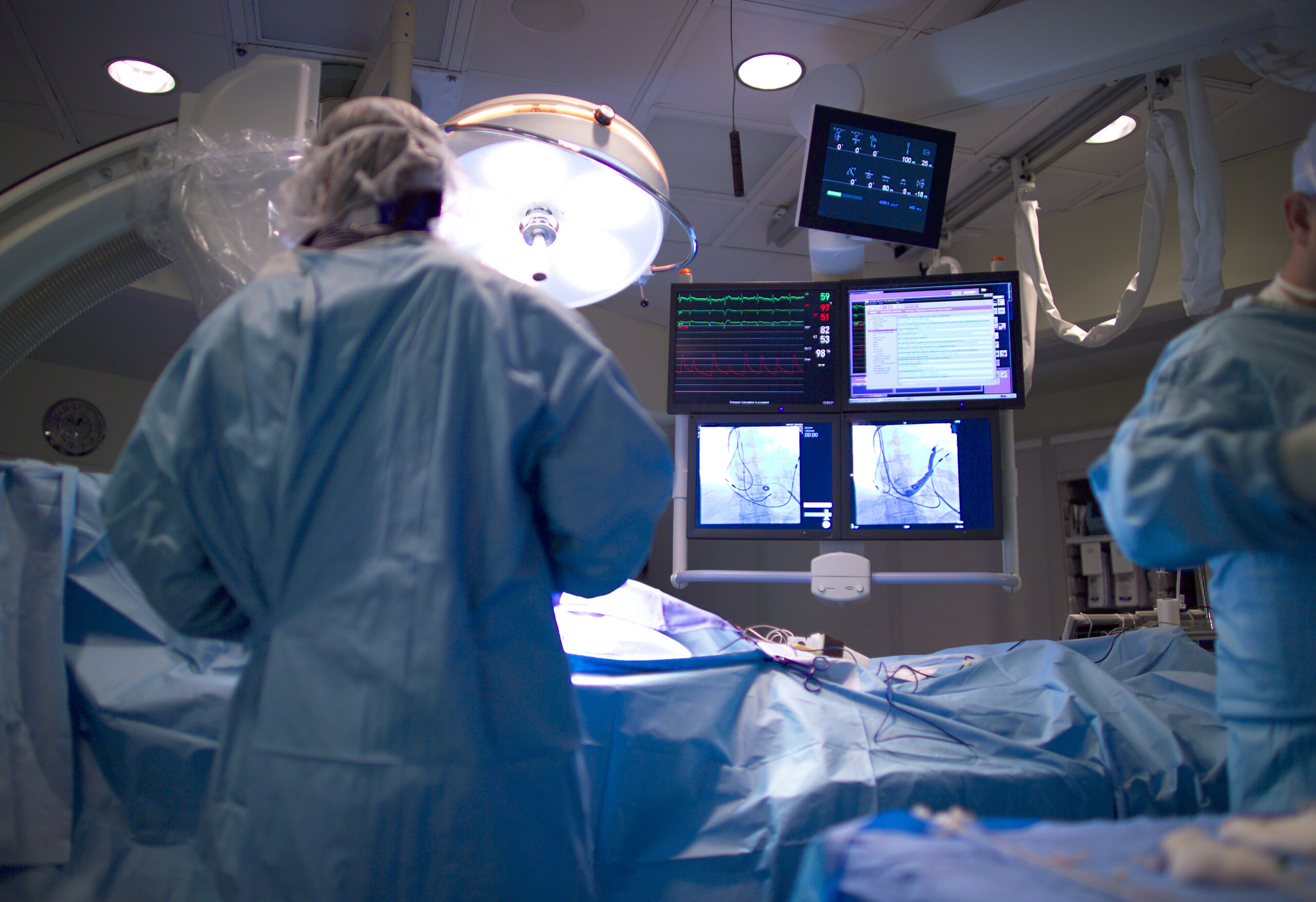In 2024, the medical device industry continues to push the boundaries of technology to improve patient outcomes and streamline clinical practices. With companies consistently innovating, it is crucial to keep an eye on the top performers in the field. This blog post delves into the top 15 medical device companies to watch in 2024, spotlighting their achievements based on 2023 revenue. These industry leaders are not only setting financial benchmarks but also driving advancements in med tech that are improving healthcare delivery.
From Medtronic’s strategic innovations to Johnson & Johnson MedTech’s robust sales growth and Abbott Laboratories’ impressive product launches, each of these companies has made strides. Siemens Healthineers, Medline Industries and Stryker have also demonstrated remarkable growth and resilience.
This detailed analysis provides insights into how these top medical device companies have leveraged their strengths, addressed market needs and positioned themselves for continued success in the coming year.
Note: When it comes to companies that report in foreign currencies, the conversion to US dollars uses the average annual exchange rates reported by the US Federal Reserve. In addition, only revenues from a company’s medical device, med tech and diagnostics divisions were included.
Related: Fastest Growing Medical Device/Medtech Companies in 2024
1. Medtronic
Fiscal Year 2023 Revenue: $31.227 billion
Medtronic, the world’s leading med tech company, had a mixed financial performance in 2023. The company reported a total revenue of $31.227 billion last year, a slight decrease of 1.4 percent compared to the previous year but an increase of 2.1 percent on an organic basis. This organic growth was achieved despite a negative impact from foreign currency translation and other one-time factors, the company said in its 2023 annual report.
Medtronic rounded out the year on a strong note as in Q4, the company reported revenues of $8.544 billion, an increase of 5.6 percent, “ahead of expectations,” said the company. This growth was driven by a recovery in procedure volumes, improvements in supply chain and the introduction of innovative products. Medtronic said its cardiovascular, medical surgical and neuroscience portfolios, along with diabetes markets outside the US, showed strong performance in 2023.
Medtronic’s strong Q4 showing was also driven by “pipeline momentum” with CE Mark of the Affera Mapping and Ablation System and Aurora Extravascular (EV)-ICD, as well as the US Food and Drug Administration (FDA) approval of the MiniMed 780G insulin pump and continuous glucose monitoring system with Guardian 4 sensor.
Medtronic also made some strategic moves last year, including a collaboration with NVIDIA to accelerate AI innovation in healthcare, and the divestiture of its Renal Care Solutions business.
2. Johnson & Johnson MedTech
2023 Revenue: $30.400 billion
J&J MedTech had a strong 2023 with reported worldwide sales of $30.400 billion, a notable increase of 10.8 percent from the previous year. On an operational basis, which excludes the impact of translational currency, the segment saw a growth of 12.4 percent. Adjusted operational sales, which further exclude the net impact of acquisitions and divestitures, grew by 7.8 percent.
This growth was primarily driven by strong sales in electrophysiology products within the Interventional Solutions division, contact lenses in the Vision segment, wound closure products in General Surgery and biosurgery products in Advanced Surgery.
The overall company performance was solid, with J&J reporting total revenues of $85.2 billion, a 6.5 percent increase from 2022. The company’s GAAP earnings per share (EPS) were $5.20, a decrease of 15.3 percent, primarily due to a one-time charge in the first quarter. However, the adjusted EPS, which excludes certain items, increased by 11.1 percent to $9.92.
J&J MedTech also made strategic acquisitions and regulatory advancements in 2023. The acquisition of Abiomed significantly contributed to the segment’s growth. Additionally, the company continued to advance its product pipeline with new launches and regulatory approvals in various international markets. These included the TECNIS PureSee IOL, a new intraocular lens (IOL) to address presbyopia, which also aims to reduce visual disturbances such as halos and glares. The company also launched a new version of its CARTO 3 Electro-Anatomical Mapping System. This system now includes new modules like CARTOSOUND FAM, which uses AI to generate precise cardiac maps, and CARTO ELEVATE, which enhances signal analysis and substrate characterization for better treatment of cardiac arrhythmias.
In November 2023, J&J announced plans to submit its OTTAVA Robotic Surgical System for an investigational device exemption (IDE) to the FDA in the second half of 2024 to initiate clinical trials in the US. The OTTAVA system is designed to transform the surgical experience by integrating four robotic arms into a standard surgical table, simplifying workflows and improving flexibility in the operating room.
3. Abbott Laboratories
2023 Revenue: $26.875 billion (Medical Devices and Diagnostics divisions)
In 2023, Abbott Laboratories’ Medical Devices and Diagnostics divisions made $26.875 billion in worldwide revenue, down from 2022’s $31.271 billion. The segments accounted for 67 percent of Abbott’s total worldwide revenue of $40.109 billion in 2023.
Products that contributed to Abbott’s strong year included its FreeStyle Libre continuous glucose monitoring (CGM) system, which continued to drive growth in the Diabetes Care segment. The system generated $4.3 billion in sales, marking a significant 20 percent increase from the previous year. This growth was bolstered by expanding the FreeStyle Libre portfolio and increased adoption worldwide.
Abbott’s cardiovascular device sales also saw substantial growth, particularly with structural heart devices and heart rhythm management products. The company’s neuromodulation products, including its BurstDR stimulation for pain management, also contributed positively to the overall performance.
Abbott had several new product launches and regulatory approvals in 2023. In December, Abbott received CE Mark approval for the AVEIR DR, the world’s first dual-chamber leadless pacemaker system, that offers new treatment options for patients with heart rhythm disorders by providing a less invasive solution with enhanced functionality. The company earned another CE Mark approval in its cardiovascular portfolio for its next-gen heart device MitraClip G4 for the treatment of mitral regurgitation.
Abbott also received FDA approval for its new GLP Systems Track last year, an innovative lab automation system designed to enhance laboratory performance and productivity. The system uses intelligent self-propelled sample carriers to reduce manual steps and errors, thus improving the efficiency and accuracy of lab operations.
Abbott’s spinal cord stimulation (SCS) systems, including the Proclaim SCS family and the rechargeable Eterna SCS platform with BurstDR SCS technology, received FDA approval in May 2023 for a new indication to treat chronic back pain in patients who are not candidates for surgery. The approval was supported by results from the DISTINCT study, which demonstrated significant pain relief and improved functionality for patients.
Abbott has projected a positive outlook for 2024, anticipating organic sales growth in the range of eight to ten percent, excluding COVID-19 testing-related sales.
4. Siemens Healthineers
Fiscal Year 2023 Revenue: 21.680 billion EUR (around $23.463 billion USD)
In 2023, Siemens Healthineers put up a solid financial performance, achieving key targets and demonstrating strong growth in several areas of its business. The company reported an overall revenue growth of 8.3 percent excluding rapid COVID-19 antigen tests. Including the impact of the antigen test business, which concluded in the fourth quarter, the comparable revenue increase was 1.2 percent.
Siemens’ Imaging segment saw a substantial comparable revenue growth of 10.9 percent and an adjusted earnings before interest and taxes (EBIT) margin of 22.4 percent.
The company’s Advanced Therapies segment reported revenue growth of 7.8 percent with an adjusted EBIT margin of 17.5 percent. The Varian business, which focuses on cancer care solutions, achieved remarkable revenue growth of 14.8 percent, while the company’s Diagnostics segment faced a decline of 24.2 percent in revenue due to the cessation of the rapid COVID-19 antigen test business. Excluding the tests, the segment showed a modest growth of 1.6 percent.
Adjusted EBIT margin, excluding the impact of rapid antigen tests, stood at 14.0 percent, which is on par with the previous year. Including these tests, the EBIT margin was 14.2 percent.
In the fourth quarter of 2023, Siemens Healthineers reported a comparable revenue growth of 10.8 percent excluding rapid COVID-19 antigen tests. Including these tests, the growth was 7.5 percent.
The Varian business showed a significant growth of 29.8 percent in Q4, contributing to the overall strong performance of the company during this period.
In 2023, Siemens Healthineers introduced several new products, including the Somatom Pro.Pulse dual-source computed tomography (CT) scanner, which is designed to make advanced CT technology more accessible to smaller facilities and outpatient centers. It features reduced lifecycle costs, lower radiation doses and optimized scanning parameters through AI-powered software.
The Acuson Maple was another notable launch by the company. The device is a lightweight, portable ultrasound system designed for diverse clinical settings, including emerging markets and small hospitals. It incorporates AI-powered features to enhance workflow efficiency and diagnostic accuracy, supporting up to 15 transducers.
At the European Congress of Radiology at the beginning of March in 2023, Siemens Healthineers launched the Acuson Sequoia Crown Edition and Acuson Sequoia Select Edition, ultrasound systems that feature advanced imaging capabilities, improved ergonomics and enhanced workflow solutions to support various clinical applications.
Siemens also received FDA clearance for its Atellica CI Analyzer for immunoassay and clinical chemistry testing. The apparatus is designed for labs with low to medium testing volumes and offers improved turnaround times, advanced reporting functionalities and enhanced security measures.
For the upcoming fiscal year, Siemens Healthineers anticipates comparable revenue growth of 4.5 percent to 6.5 percent, excluding revenue from rapid COVID-19 antigen tests. Adjusted basic EPS are expected to be between €2.10 and €2.30.
5. Medline Industries
2023 Revenue: $23.2 billion
Medline Industries reached over $23 billion in revenue in 2023.
In 2023, Medline Industries focused on expanding its product portfolio and enhancing its operational capabilities through several key launches and strategic initiatives.
Medline received FDA clearance for its new safety insulin and TB syringes, designed to enhance patient safety and usability. These syringes are part of Medline’s commitment to providing reliable and safe medical devices for everyday clinical use.
Medline also introduced new solutions for reducing hospital-acquired infections last year. The company’s urological and vascular access health solutions were deployed in hospitals to help decrease the incidence of central line-associated bloodstream infections (CLABSIs) and catheter-associated urinary tract infections (CAUTIs). This involved comprehensive assessments, toolkits and training programs tailored to meet the specific needs of healthcare providers.
The company also developed new packaging for its Remedy Skin Care line with input from frontline clinicians. The updated packaging is designed to be more intuitive and user-friendly, aiming to improve the effectiveness of skin care in clinical settings.
In 2023, Medline also announced a significant leadership transition. After over 26 years, CEO Charlie Mills, President Andy Mills and COO Jim Abrams retired, effective October 1, 2023. Jim Boyle, who has been with Medline since 1996, took over as CEO, and Jim Pigott assumed the role of President and COO. This transition marked a new era of leadership while maintaining continuity in the company’s strategic vision.
Last year, Medline continued its multi-year, multi-billion-dollar investment campaign, allocating an additional $300 million in 2023 to improve operations, manufacturing, technology and sustainability. This initiative included opening new distribution centers in locations such as St. Peters, Missouri and Salt Lake City, Utah, and expanding its AutoStore automated warehouse picking systems to 19 of its distribution centers.
6. Stryker
2023 Revenue: $20.498 billion
Stryker, a global leader in medical technologies, reported strong financial performance in 2023. The company’s total revenues increased 11.1 percent from 2022.
This growth was driven by robust demand across its diverse portfolio, including Medical and Surgical Equipment (MedSurg), Neurotechnology, Orthopedics and Spine products. Stryker’s commitment to innovation and operational excellence contributed to a 34.2 percent increase in net earnings, which reached $3.16 billion, up from $2.36 billion the previous year. The company’s investment in research, development and engineering totaled $1.4 billion, underlining its dedication to advancing healthcare technology.
In 2023, Stryker achieved significant milestones in its medical device portfolio, with multiple FDA clearances highlighting its innovative capabilities.
Stryker continued to expand its Mako SmartRobotics system, which enhances surgical precision in joint replacement procedures. The system integrates advanced imaging and robotic technology to improve patient outcomes — such as less pain and shorter recovery time — and operational efficiency in the operating room. Stryker was recently issued a Class 2 recall by the FDA due to an observed increase in the Software Error #3 (SE3) error code in the Mako 3.0 and 3.1 systems, potentially leading to treatment delays. Stryker has provided mitigation steps, including system restart procedures and specific software updates, to address this issue and prevent its recurrence.
The company introduced new imaging technologies — such as the FDA-approved 1788 surgical camera platform for clear surgical images and the SPY-Portable Handheld Imaging system (SPY-PHI) for visualizing blood flow and anatomy — that enhance diagnostic accuracy and surgical planning. These systems leverage AI and machine learning to provide real-time data and improve clinical decision-making.
Stryker’s AI-driven tools for surgical planning and navigation — such as the Q Guidance System that provides computer-assisted planning and guidance during cranial procedures — are designed to streamline surgical workflows and enhance patient care.
Across the globe, Stryker recently expanded its R&D facility in India to include lifecycle testing of medical devices.
In the first quarter of 2024, Stryker’s MedSurg and Neurotechnology segment led with total sales of $2.99 billion, with overall net sales rising 9.7 percent. Looking ahead, Stryker expects full-year 2024 organic net sales growth to be between 8.5 and 9.5 percent.
7. Philips
2023 Revenue: 18.169 billion EUR ($19.653 billion USD)
Philips is a global leader in health technology focusing on improving people’s health and well-being through meaningful innovation. The company’s portfolio includes Diagnostic Imaging, Image-Guided Therapy, Patient Monitoring and Health Informatics, as well as Consumer Health and Home Care Products.
In 2023, Philips reported significant growth, with a comparable sales growth of six percent. This growth was driven by strong performance across its Health Technology segments. Sales growth in the Diagnosis & Treatment segment was notable at 11 percent on a comparable basis, driven by double-digit growth in Ultrasound and Image-Guided Therapy and high single-digit growth in Diagnostic Imaging.
The company also reported remediation efforts (99 percent) toward the voluntary recall of some of its sleep and respiratory care devices.
At the Radiological Society of North America’s annual 2023 meeting (RSNA23), Philips launched the EPIQ Elite 10.0 and Affiniti next-gen ultrasound systems, the BlueSeal MRI Mobile and new AI-enabled cloud solutions to enhance radiology efficiency. They also unveiled the MR 7700 3.0T system for improved imaging and faster diagnosis.
Philips boasted several other notable achievements in 2023. In Shanghai, five hospitals installed the advanced Spectral CT 7500 imaging system. The company expanded its ultrasound portfolio with the Compact 5500 CV and introduced the IntraSight Mobile system in China. Additionally, the Zenition 10 and Zenition 30 imaging solutions were launched to support various surgical procedures.
June 2024 saw the revelation of several advancements and launches in Philips’ arsenal. On June 25, 2024, Philips’ LumiGuide 3D medical device guidance solution won the prestigious ‘Best of the Best’ 2024 Red Dot Design Award. This innovation leverages Philips’ Fiber Optic RealShape (FORS) technology to provide real-time, 3D and color visualization of interventional devices inside the patient’s body with minimal radiation. LumiGuide offers a groundbreaking improvement in medical device guidance.
Phillips’ Duo Venous Stent System, an implantable medical device system, was used for the first time outside of a clinical trial. This system is designed to treat symptomatic venous outflow obstruction (obstruction in venous blood flow that causes blood to pool) in patients with chronic venous insufficiency (CVI). The VIVID study demonstrated the safety and efficacy of this system, showing a 12-month effectiveness endpoint for primary patency of 90.2 percent and a primary safety endpoint of 98.7 percent.
8. GE Healthcare
2023 Revenue: $19.552 billion
GE Healthcare is a global giant in medical technology, diagnostics and digital solutions. The company’s products and services are from their Imaging, Ultrasound, Patient Care Solutions and Pharmaceutical Diagnostics divisions.
In 2023, GE Healthcare reported substantial success, driven by strategic initiatives and strong market demand. The Imaging segment saw substantial growth, driven by strong demand for magnetic resonance imaging (MRI) and CT systems. Additionally, the Ultrasound and Life Care Solutions segments performed well, reflecting increased adoption of advanced technologies and devices across global markets.
The completion of GE Healthcare’s spin-off from General Electric allowed for streamlined operations and focused growth, leading to a year-over-year increase of seven percent and growth across all segments and regions. The company’s focus on innovation and operational efficiency led to increased gross profits of $7.9 billion.
GE Healthcare significantly advanced its medical devices, medical technologies and diagnostics portfolio in 2023, securing multiple FDA clearances for AI-enabled medical devices. “We topped the FDA list with the most AI-enabled medical device authorizations of any other medical technology company, with 58, and increased our investment in R&D to almost $1 billion to help meet the needs of a dynamic and evolving global health ecosystem,” said Peter J. Arduini, GE Healthcare’s President and CEO in their 2023 sustainability report.
Notable innovations included Sonic DL for faster — up to 12 times faster than conventional methods — MRI scans, Auto Segmentation for delineating organs at risk in radiation therapy and Caption Guidance for real-time guidance in cardiac ultrasound imaging.
The introduction of SIGNA Champion, an MRI scanner with a 1.5T wide bore, promises quicker scans and sharper images making advanced MRI technologies accessible to a wider patient population. Additionally, the PREDICTOM project aims to develop an AI-screening platform for early, comprehensive Alzheimer’s disease detection.
At the European Society for Therapeutic Radiology and Oncology (ESTRO) 2024 Congress, GE Healthcare unveiled the Revolution RT, a new radiation therapy CT solution designed to improve imaging accuracy and streamline simulation workflows. Additionally, the company showcased an updated AI-enhanced Intelligent Radiation Therapy (iRT) platform, interfacing with the Spectronic MRI Planner (an AI-driven system for radiation therapy dose calculation) and incorporating the newly acquired MIM Software portfolio for AI-enabled imaging analytics and digital workflow solutions.
These initiatives underscore GE Healthcare’s dedication to leveraging AI and digital technologies to transform healthcare delivery, precision care, clinical workflows and enhance patient care globally.
9. Becton Dickinson
2023 Revenue: $19.372 billion
Becton Dickinson (BD) is one of the largest world leaders in med tech. It specializes in developing and manufacturing medical supplies, devices, laboratory equipment and diagnostic products.
The company had a 2.7 percent increase in total revenues from the previous year (2022), and a 4.5 percent increase on a currency-neutral basis. The base business revenue, excluding COVID-19-related diagnostic testing, grew by 5.1 percent as reported and seven percent on a currency-neutral basis.
In the BD Medical segment, the Medication Management Solutions unit launched the updated BD Alaris Infusion System and the new PIVO Pro Needle-Free Blood Collection Device, enhancing patient care standards across US hospitals. The Medication Delivery Solutions unit advanced its “One-Stick Hospital Stay” vision with next-generation needle-free blood draw technology, which reduces added needlesticks and, thereby, fear and anxiety among patients. BD also announced an increase in domestic syringe production following FDA safety communication regarding certain non-BD plastic syringes. Data from a new study showed that the BD Pyxis MedBank Automated Dispensing Cabinet system improves clinical workflow and operational efficiency in long-term care facilities.
The Integrated Diagnostics Solutions business unit within the BD Life Sciences segment received FDA 510(k) clearance for the BD Respiratory Viral Panel for the BD MAX System, a molecular diagnostic combination test that identifies and differentiates between COVID-19, influenza A/B and respiratory syncytial virus (RSV) in a single sample. BD’s AGILITY investigational device exempt (IDE) international study enrolled its first patient to assess the BD Vascular Covered Stent’s effectiveness in treating peripheral arterial disease (PAD), a debilitating condition that can put patients at risk of limb amputation.
The Peripheral Intervention unit enrolled its first patient in the ARCH study to investigate the BD Liverty Transjugular Intrahepatic Portosystemic Shunt (TIPS) Stent Graft to reduce complications associated with portal hypertension.
For the first quarter of 2024, BD reported a 2.6 percent increase in net sales to $4.7 billion. BD also received the FDA 510(k) clearance for the transformative, minimally invasive fingertip blood collection device called the MiniDraw Capillary Blood Collection System. In the second quarter of 2024, BD reported a 4.6 percent increase in net sales to $5.0 billion with the Medical segment leading with $2.45 billion in revenues.
BD expects organic net sales growth between 8.5 percent and 9.5 percent for full year 2024. The company completed an industry-first circular economy pilot, partnering with Casella Waste Systems, Inc., to recycle 40,000 pounds of medical waste. BD also ranked in the Top 10 for Overall Transparency and was awarded Best Code of Conduct among S&P 250 companies in the US Transparency Awards.
10. Roche
2023 Revenue: 14.104 billion CHF ($15.699 billion USD) from Roche’s Diagnostics division
Roche leads pharmaceutical and diagnostics innovations globally to make healthcare more personalized, which improves patient outcomes and optimizes healthcare resources.
Roche’s 2023 financial performance was driven by its innovative product pipeline and strategic investments. The company’s total sales reflected robust growth across its Pharmaceuticals and Diagnostics divisions.
Roche’s Diagnostics division benefited from the demand for COVID-19 testing solutions and routine diagnostic products. This division also achieved notable advancements with new technologies to improve the speed, accuracy and integration of diagnostic testing, supporting personalized healthcare approaches.
In June 2024, the World Health Organization (WHO) awarded Roche’s human papillomavirus (HPV) test prequalification designations for use on the cobas 5800 System and for self-collected samples on the cobas 5800, 6800 and 8800 Systems. This expands access to cervical cancer screening tools, particularly in low- and middle-income countries (LMICs). These designations build upon last June’s WHO prequalification that included the cobas HPV test for use on the cobas 6800 and 8800 Systems. The WHO prequalification enables LMICs to use Roche HPV screening solutions in their national cervical cancer elimination programs, greatly increasing access.
Roche launched new analytical units, cobas c 703 and cobas ISE neo, for the cobas pro integrated solutions. The cobas c 703 analytical unit offers industry-leading high throughput clinical chemistry testing with up to 2,000 tests per hour, and the cobas ISE neo analytical unit delivers more efficient ion selective electrode (ISE) testing, reducing hands-on time through automated maintenance.
Roche received the FDA’s Breakthrough Device designation for its Elecsys pTau217 plasma biomarker test for early Alzheimer’s disease diagnosis. This test, developed in collaboration with Eli Lilly, aids in identifying amyloid pathology, a key feature of Alzheimer’s disease, which can facilitate early and accurate diagnosis, improving access to appropriate care and potentially mitigating the disease’s impact.
Roche also received FDA approval for the first-ever molecular blood-screening test for malaria in blood donors. CEO of Roche Diagnostics, Matt Sause said in the press release, “The approval of cobas Malaria represents a significant advancement in malaria detection, offering healthcare professionals a reliable tool for donor screening and improving the safety of patients worldwide.”
In the first quarter of 2024, Roche continued its growth trajectory with seven percent and eight percent base business growth observed in the Pharmaceuticals and Diagnostics divisions, respectively.
11. Baxter
2023 Revenue: $14.81 billion
Founded in 1931, Baxter was the first commercial manufacturer of prepared IV solutions and has since become a pioneer in the med tech industry. The company offers a diverse portfolio of diagnostic, critical care, kidney care, nutrition, hospital and surgical products used across various care settings, including patient homes, hospitals and physician offices.
In 2023, Baxter implemented several strategic initiatives to enhance performance. Within its Healthcare Systems and Technology segment, Baxter made significant advancements, such as launching a digital image capture capability for eye exams using its Welch Allyn PanOptic Plus Ophthalmoscope.
The company also introduced its next-generation intensive care unit (ICU) beds and commercially launched the new Baxter Patient Warming System, which minimizes risks associated with forced air warming, reduces noise and waste in the operating room and eases clinician workflows.
12. Boston Scientific
2023 Revenue: $14.240 billion
Boston Scientific is dedicated to transforming lives by providing innovative medical solutions that enhance patient health worldwide. In 2023, the company experienced significant growth, launching nearly 90 products driven by substantial merger and acquisition activities. It also fueled its product pipeline, conducted 63 clinical trials involving over 23,000 patients to generate robust clinical evidence, enhanced supply chain agility and expanded its digital and operational capabilities.
Boston Scientific broadened its product portfolio and received FDA clearance for the LithoVue Elite digital flexible ureteroscope. It also gained FDA approval for its latest-generation left atrial appendage closure (LAAC) technology, the WATCHMAN FLX Pro device. Additionally, the company received approval for the POLARx Cryoablation System, featuring the POLARx FIT Cryoablation Balloon Catheter. This device offers the unique capability of enabling two balloon sizes from a single catheter, providing procedural flexibility and individualized patient care. Furthermore, Boston Scientific received FDA approval for an expanded indication of the WaveWriter Alpha Spinal Cord Stimulator System to manage painful diabetic peripheral neuropathy.
To further strengthen and expand its capabilities, Boston Scientific acquired Apollo Endosurgery Inc. and Relievant Medsystems Inc. According to the 2023 performance report, Boston Scientific served more than 37 million patients and invested approximately $1.4 billion in research and development.
13. Danaher
2023 Revenue: $9.577 billion (for Danaher’s Diagnostics division)
Founded in 1984, Danaher, a leading global life sciences and diagnostics innovator, had a transformational year. Its three core areas — Biotechnology, Diagnostics and Life Sciences — experienced better-than-expected revenues despite declining demand for COVID-19 products.
Its Diagnostics segment provides clinical instruments, consumables, software and services used by hospitals, physician offices, reference laboratories and other critical care facilities to diagnose diseases and determine appropriate treatments.
The demand for respiratory diagnostics has surged dramatically, resulting in Danaher’s Cepheid respiratory franchise becoming over six times larger than it was pre-pandemic. Industry experts predict that Cepheid will sustain this strong market position long-term, owing to its distinctive products and leadership in point-of-care diagnostics.
Danaher’s Beckman Coulter unveiled the DxI 9000 high-resolution immunoassay analyzer, which meets clinical laboratory demands for speed, reliability, reproducibility, quality and menu expansion.
Additionally, in 2023 Danaher completed the spin-off of its Environmental & Applied Solutions segment, forming the independent company Veralto.
14. B. Braun
2023 Revenue: 8.755 billion EUR ($9.470 billion USD)
For over 180 years, B. Braun’s innovative contributions have shaped the healthcare industry. The B. Braun Group’s extensive international presence and diverse portfolio have significantly boosted the med tech company’s sales.
Braun’s business is divided into three main groups: Hospital Care, Aesculap and Avitum. Hospital Care experienced notable growth due to increased demand for IV solutions, single-use products for automated infusion systems, IV sets and accessories, IV catheters and regional anesthesia products. The Aesculap division expanded robustly, driven by surgical instruments, hip and knee implants, imaging systems and suture materials. Avitum’s sales increased through its extracorporeal blood therapy products, wound and ostomy care items and renal care centers.
Despite a volatile market environment and various one-off effects, B. Braun continued to increase its investments in 2023, allocating 1.2 billion EUR (around $1.3 billion USD) to enhancing production capacity, advancing research and development and adopting new technologies. The company aims to leverage robotics, AI and automation to streamline processes and make innovative healthcare solutions more accessible.
15. Fresenius
2023 Revenue: 8.009 billion EUR ($8.663 billion USD) from the Fresenius Kabi division
Fresenius Medical Care provides dialysis and other healthcare services for individuals with renal diseases. It operates dialysis clinics and offers a range of services including value and risk-based care programs, pharmacy services, specialty services in vascular, cardiovascular and endovascular care, ambulatory surgery center services and physician nephrology and cardiology services.
Additionally, Fresenius Medical Care is a leader in dialyzers, contributing to around 40 percent of the global supply.
In 2023, approximately 50 percent of all installed hemodialysis machines were produced by Fresenius Medical Care, and about 14 percent of all peritoneal dialysis patients use its products.
The company’s home dialysis portfolio saw the launch of an upgraded Liberty Select cycler enabled by remote therapy management. There were significant improvements and FDA 510(k) clearances for the GuideMe software to further simplify home hemodialysis. Enhancements to the NxStage Pureflow SL platform have been submitted to the FDA and are awaiting approval.
Advancements in in-center dialysis products by Fresenius Medical Care include the 5008X Hemodialysis System and companion FX CorAL dialyzer, which has been cleared by the FDA for use in the US. This dialyzer features improved membrane structures that enhance the removal of larger molecules while minimizing the loss of essential substances like serum albumin.











Join or login to leave a comment
JOIN LOGIN